 SAN DIEGO—During ACR Convergence 2023 in November, the ACR honored a group of individuals who have made significant contributions to rheumatology research, education and patient care by announcing the recipients of the ACR’s 2023 Awards of Distinction, as well as the 2023 ACR Masters who were recognized for their contributions to the field. The January 2024 issue will feature the 2023 ACR Distinguished Fellows, the ARP Merit Awards and the ARP Master recipients.
SAN DIEGO—During ACR Convergence 2023 in November, the ACR honored a group of individuals who have made significant contributions to rheumatology research, education and patient care by announcing the recipients of the ACR’s 2023 Awards of Distinction, as well as the 2023 ACR Masters who were recognized for their contributions to the field. The January 2024 issue will feature the 2023 ACR Distinguished Fellows, the ARP Merit Awards and the ARP Master recipients.
Presidential Gold Medal
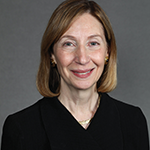
Dr. Gravallese
The highest award the ACR can bestow, the Presidential Gold Medal is awarded in recognition of outstanding achievements in rheumatology over an entire career. This year’s Presidential Gold Medal Award went to Ellen M. Gravallese, MD, the Theodore Bevier Bayles Professor of Medicine at Harvard Medical School, Boston, and chief of the Division of Rheumatology, Inflammation, and Immunity at Brigham and Women’s Hospital, Boston.
“Receipt of the [ACR’s Presidential] Gold Medal Award is a tremendous honor, and I am deeply moved by this recognition,” Dr. Gravallese says. “My career in rheumatology originated from a love of scientific inquiry and a desire to understand the mechanisms of diseases involving the immune system. I could never have predicted the tremendous joy I would experience from scientific discovery and from the many other facets of my career in our field.”
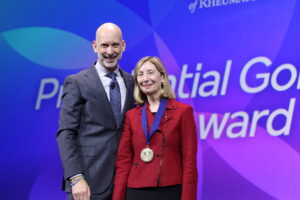
Dr. Doug White presented the Presidential Gold Medal to Dr. Ellen Gravallese
Dr. Gravallese received her undergraduate degree in biochemistry from Harvard College, Cambridge, Mass., and her medical degree from Columbia University College of Physicians and Surgeons, New York. She completed a combined residency in internal medicine and pathology at Brigham and Women’s Hospital, where she also served as a fellow in the Division of Rheumatology, Immunology and Allergy. Her career path took her to the Harvard Institutes of Medicine, where she did basic research and served as the director of molecular pathology. She then served as chief of the Division of Rheumatology at University of Massachusetts, Worcester, prior to taking her current position, which she began in October 2019.
Dr. Gravallese’s research has focused on the fundamental mechanisms of inflammation and joint destruction in inflammatory arthritis. Her laboratory elucidated key cell types and pathways by which inflammation impacts bone in rheumatic diseases. This work identified osteoclasts as the cell type responsible for bone destruction in rheumatoid arthritis (RA) and demonstrated that RANKL is a critical cytokine produced by cells within RA synovial tissues that drives osteoclastogenesis. In addition, her laboratory identified the production within RA synovial tissue of inhibitors of osteoblast function that prevent healing of bone. This work helped launch the new field of osteoimmunology.
Work in Dr. Gravallese’s laboratory currently focuses on innate immune pathways in inflammation in rheumatic disease, including the cytosolic DNA sensing pathways that allow a rapid response to invading pathogens, and also have the capacity to recognize and respond to self nucleic acids. She has been continuously funded for 25 years by the National Institutes of Health (NIH), the Rheumatology Research Foundation and other agencies, and she lectures nationally and internationally on her work.
Dr. Gravallese has served on numerous national boards and committees, including as a member of the National Institute of Arthritis and Musculoskeletal and Skin Diseases Advisory Council at NIH, the Board of Directors of the ACR and the Rheumatology Research Foundation, and as chair of the ACR Journal Publications Committee. In November 2020, she completed her term as the 83rd president of the ACR. She currently also serves as associate editor of the New England Journal of Medicine.
“There is so much more to be done in our field, and I am inspired by the talent I recognize in our young trainees and faculty,” says Dr. Gravallese. In this next phase of her career, she plans to continue her scientific work and to help promote the careers of young faculty, as well as provide support to women in medicine and science.
Distinguished Basic/Translational Investigator Award
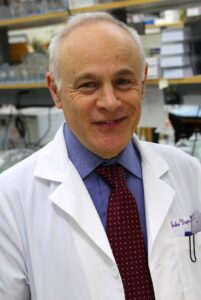
Dr. John Varga
The Distinguished Basic/Translational Investigator Award, recognizing outstanding contributions to the field of rheumatology, was given to John Varga, MD, Frederick G. L. Huetwell Professor of Rheumatology, professor of internal medicine and chief of the Division of Rheumatology, University of Michigan Medical School, Ann Arbor.
Dr. Varga was born in Hungary and, at age 15, emigrated with his family as refugees. After learning English, Dr. Varga attended Columbia University, New York. Following graduation, he spent a year at Columbia’s Radiation Biology Laboratory, headed by Professor Eric Hall. This experience solidified his plans to pursue biology and medicine. He started medical school in Guadalajara, Mexico, and graduated from New York University. He completed his rheumatology fellowship at Boston University. Seeking to learn disease mechanisms, he did postdoctoral research in the lab of Sergio Jimenez, MD, at the University of Pennsylvania, Philadelphia, where he studied connective tissue regulation in health and disease.
These basic studies led him to scleroderma, the rheumatic disease most associated with connective tissue alterations. The lab helped identify TGF-ß as a key fibroblast activation trigger in scleroderma and delineated some of the underlying intracellular pathways and intercellular communications.
Dr. Varga served on the faculty of the University of Illinois and Northwestern University, Chicago, and was appointed chief of rheumatology at the University of Michigan in 2020.
For the past three decades, Dr. Varga’s research has focused on fibrosis and the application of precision medicine approaches to improve patient outcomes. His lab investigates immunological and cellular mechanisms of fibrosis.
He is the author of more than 450 journal articles and book chapters, and three textbooks. He has mentored postdoctoral MD and PhD trainees, many of whom have gone on to develop successful academic or industry careers.
Dr. Varga has served as a charter member of the National Institutes of Health’s Arthritis, Connective Tissue and Skin (ACTS) Study Section, a co-editor of Arthritis & Rheumatology and on the ACR Board of Directors.
Volunteering for the ACR “brings me together with inspiring colleagues and friends from around the world and allows me to be part of the global rheumatology community,” Dr. Varga says. “But most importantly, I am incredibly fortunate to be supported by my amazing family, who graciously put up not only with my travels and crazy work hours, but even with my terrible dad jokes and my passion for Bob Dylan.
“It is wonderful to see the humble fibroblast, the focus of our research, recognized as an important player, and maybe even a therapeutic target, in rheumatic diseases,” Dr. Varga noted. “My gratitude to my mentors, colleagues, trainees and patients for inspiration, and to my family for giving me the opportunity to work on something I feel passionate about.”
Distinguished Clinical Investigator Award
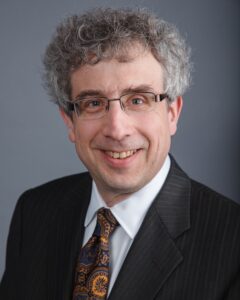
Dr. Peter Merkel
Peter A. Merkel, MD, MPH, professor of medicine and epidemiology and chief of rheumatology at the University of Pennsylvania, Philadelphia, received this year’s Distinguished Clinical Investigator Award, given annually to a clinical scientist making outstanding contributions to the field of rheumatology.
Dr. Merkel attended Yale School of Medicine, New Haven, Conn. He completed his residency at the Hospital of the University of Pennsylvania and his fellowship at the Massachusetts General Hospital/Harvard Medical School, Boston. He received a master’s in public health from Harvard School of Public Health, Boston. Prior to moving to the University of Pennsylvania, Dr. Merkel was a faculty member at Harvard Medical School and Boston University School of Medicine.
An internationally recognized research and clinical expert in vasculitis and scleroderma, Dr. Merkel has studied these diseases for more than 20 years. He is the principal investigator of the Vasculitis Clinical Research Consortium, the leading research infrastructure for vasculitis clinical investigation that conducts projects worldwide. He is an author on more than 400 scientific publications.
Dr. Merkel’s research in vasculitis focuses on clinical trial design and conduct, outcome-measure development, clinical epidemiology, genetic epidemiology and biomarker discovery. He chairs the OMERACT Vasculitis Working Group. Dr. Merkel has also conducted substantial research in scleroderma, with a focus on outcome measures and clinical trial design. His research has made seminal contributions to our understanding of these conditions, and he has advanced new methods to conduct clinical research in these rare diseases. Dr. Merkel’s work has led to new, more effective and safer therapies and treatment strategies for patients with vasculitis.
Dr. Merkel receives the majority of his research support from the National Institutes of Health (NIH), the U.S. Food & Drug Administration and the Patient-Centered Outcomes Research Institute (PCORI), and receives additional funding from industry sources and private foundations.
Over the years, Dr. Merkel has served the field of rheumatology in many ways, including as a member of committees of the ACR, serving on NIH study sections, working in several editorial positions and chairing international research conferences. He has worked with patients for many years through his activities with the Vasculitis Foundation and the National Scleroderma Foundation. Dr. Merkel has also been a highly effective mentor to trainees and early career investigators who have gone to conduct important independent research and assume leadership positions.
“I am greatly honored to receive this award from my colleagues in the College,” says Dr. Merkel. “I view this as an acknowledgement of not only my own achievements, but also the efforts of the many remarkable collaborating investigators and patients with whom I have had the privilege to work throughout my career.”
Distinguished Clinician Scholar Award
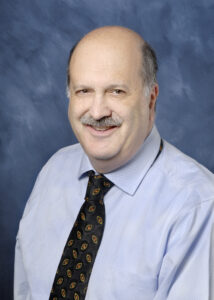
Dr. Daniel J. Wallace
The Distinguished Clinician Scholar Award, given to a rheumatologist who has made outstanding contributions in clinical medicine, clinical scholarship or education, was presented this year to Daniel J. Wallace, MD, FACP, MACR, a board-certified internist and rheumatologist. A professor of medicine at the David Geffen School of Medicine, University of California, Los Angeles (UCLA), Dr. Wallace is the associate director of the Rheumatology Fellowship Program at Cedars-Sinai Medical Center, Los Angeles, where he also serves on the Board of Governors.
While a fellow at UCLA, Dr. Wallace conducted pioneering arthritis research and developed a close relationship with his mentor, Edmund Dubois, MD. Dr. Dubois had the largest lupus practice in the U.S. at the time and was the principal editor of the only lupus textbook. Dr. Wallace assumed Dr. Dubois’ practice upon his passing in 1985.
Dr. Wallace is the author of eight medical textbooks (including the last six editions of Dr. Dubois’ Lupus Erythematosus, All About Fibromyalgia, The Lupus Book, All About Osteoarthritis, The New Sjögren’s Syndrome Handbook and Fibromyalgia & Other Central Pain Syndromes). In addition, he has authored nearly 450 peer reviewed manuscripts and 30 book chapters; his work can be found in The New England Journal of Medicine, Annals of Internal Medicine, The Lancet, The Journal of Clinical Investigation, The Journal of Immunology and the Journal of the American Medical Association (JAMA). He has conducted numerous clinical trials and currently has three National Institutes of Health grants and one U.S. Department of Defense grant.
Dr. Wallace serves on the Board of Directors of the Lupus Research Alliance and Lupus Therapeutics, is a past chair of the Lupus Foundation of America and has served on the Board of Directors of the United for Scleroderma Foundation and on the Sjögren’s Foundation, where he chairs its Clinical Trials Consortium. He has been chief of rheumatology at the City of Hope and Cedars-Sinai Medical Center and chair of the Rheumatology Research Foundation.
Dr. Wallace is the recipient of the Lupus Foundation of America Humanitarian Award, Achievement Award of the Lupus Research Institute, Spirit Award of the National Scleroderma Foundation, the Jane Wyman Humanitarian Award from the Arthritis Foundation and the Healthcare Professional Leadership Award from the Sjögren’s Foundation.
Dr. Wallace has been recognized as one of the 200 best doctors in the nation by Town and Country magazine, and among the best doctors in Los Angeles by Los Angeles Magazine, Best Doctors in America editions since 1994. Dr. Wallace spends 20% of his time teaching and in clinics, where he provides free medical care. His efforts have raised over $20 million for various rheumatic disease organizations.
“I am deeply honored to have my years of service to the ACR recognized,” Dr. Wallace says, “and I hope to be able to continue to contribute in a meaningful way to the future initiatives of the College.”
Distinguished Fellowship Program Director Award
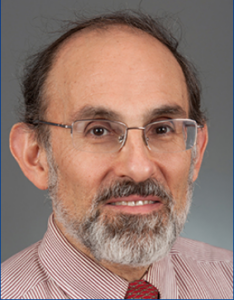
Dr. Robert Picard Sundel
The Distinguished Fellowship Program Director Award is awarded to a current or former rheumatology program director who has made outstanding contributions in mentoring and training future rheumatologists; this year’s recipient is Robert Picard Sundel, MD, Fred S. Rosen Chair in Pediatric Rheumatology, Boston Children’s Hospital (BCH), and associate professor of pediatrics, Harvard Medical School, Boston. Dr. Sundel served as the director of the Rheumatology Fellowship Program at BCH for 27 years.
Dr. Sundel studied medicine at Boston University School of Medicine and completed his internship and residency at Babies Hospital, New York, and his fellowship at BCH.
Dr. Sundel’s service to the profession includes being a member of the ACR’s Education Committee and the ACR’s Disease Guideline Panel and Vasculitis Development Group. He served on the executive committee of the Pediatric Rheumatology Section of the American Academy of Pediatrics from 1996 until 2002. From 2011–14, Dr. Sundel was a member of the executive committee of the Childhood Arthritis and Rheumatology Research Alliance. He also served as a member of the joint Infectious Diseases Society of America/American Academy of Neurology Lyme disease committee. Dr. Sundel chaired the Childhood Arthritis and Rheumatology Research Alliance Scleroderma, Vasculitis and Rare Diseases committee. He is an author on more than 100 articles.
“I am truly appreciative and overwhelmed by this Distinguished Fellowship Program Director Award,” says Dr. Sundel. “However, it is clear that a 40-year-old institution such as the Boston Children’s Hospital Pediatric Rheumatology Fellowship cannot reach such a level without many peoples’ involvement, support from additional organizations and fortuitous timing.
“Among those who were most central in creating the possibility that I could be the fellowship program director for 27 years were my parents. Both Gloria and Arthur were gifted college teachers during their careers. In addition to observing much information, I also learned the importance of working hard and seeking mentors who are happy to share their knowledge,” says Dr. Sundel.
Numerous experts at BCH were generous with their time. “Among the first was Jean Jackson, MD, a full-time adult rheumatologist at Brigham and Women’s Hospital, Boston, who was the best clinician I have encountered,” Dr. Sundel says. “She volunteered at Children’s Hospital, teaching thoroughly and patiently bedside examinations and medical history taking. Additional mentors were available because our program has always been one of very few pediatric training hospitals in which rheumatology is one of the programs within the Immunology Division. That meant that all rheumatology trainees covered the full curriculum that would prepare them for the immunology-allergy boards if so desired. As a result, we also learned from world-class immunologists, such as Fred Rosen, MD, an innovator of therapeutic treatments of IVIG [intravenous immunoglobulin], and his successor, Raif Geha, an expert in abnormalities of T cells.”
If one is to be recognized as having a distinguished fellowship program, Dr. Sundel asserts, find the best and most trainees you can. “As Rabbi Chanina declared more than 2,000 years ago: ‘I have learned much from my teachers, more from my colleagues, and most from students.’ Among the scores of alumni of the Boston Children’s Hospital rheumatology fellowship, many have gone on to become renowned researchers, educators and honored program chiefs in all corners of North America and five of the other continents. We did not create their talents, but, rather, they made us and our training program the special Distinguished Fellowship Program Award with which we are being honored.”
Distinguished International Rheumatology Professional Award
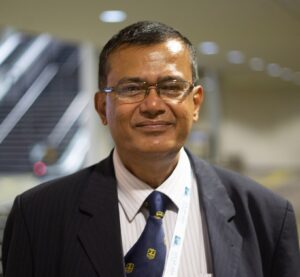
Dr. Debashish Danda
Introduced in 2021, the Distinguished International Rheumatology Professional Award is given to a rheumatologist or rheumatology health professional working outside the U.S. and Canada for exceptional contributions in public service and advocacy to the global rheumatology community. This year’s recipient is Debashish Danda, MD, DM, FRCP, FACR, FAMS, FICP, senior professor and founder of the Department of Clinical Immunology and Rheumatology, Christian Medical College and Hospital, Vellore, India.
Dr. Danda received his MBBS from the Jawaharlal Institute of Postgraduate Medical Education & Research, Puducherry, India; an MD in internal medicine from Ganesh Shankar Vidyarthi Memorial Medical College, Kanpur, India; and a three-year, post-doctoral degree in clinical immunology from Sanjay Gandhi Postgraduate Institute of Medical Sciences, Lucknow, India. He completed three years of advanced training in rheumatology at teaching hospitals in Adelaide, Australia.
Dr. Danda established the Department of Clinical Immunology and Rheumatology at Christian Medical College, providing outpatient and in-patient facilities, consultations, procedures, teaching programs, research facilities and the creation of faculty positions, basic scientist posts and technician positions. He also established comprehensive laboratory facilities for autoimmune rheumatic diseases. The department is among the handful of centers in India with a dedicated extremity magnetic resonance imaging machine, ultrasonography, nailfold capillaroscopy, real-time polymerase chain reaction testing and several other advanced techniques. He has started DM training (three-year fellowship) in rheumatology and clinical immunology, as well as a PhD program accredited by the university and India’s National Medical Commission.
Built single handedly by Dr. Danda, the department has one of the largest cohorts in the world of systemic autoimmune diseases, including more than 1,000 patients living with Takayasu arteritis and a similar number living with primary Sjögren’s disease. The department has cohorts of more than 20,000 each of patients with rheumatoid arthritis and spondyloarthritis, and more than 15,000 patients with lupus. The department sees approximately 110,000 patients every year as outpatients and approximately 2,000 as inpatients. Over the past 20 years, the department has published an average of 20+ original research papers annually. The most important publication includes work on designing the disease assessment instrument for Takayasu arteritis—the ITAS (Indian Takayasu Activity Score) 2010 and ITAS-A score.
Dr. Danda is an examiner for fellowship (DM training) and PhD examinations, as well as an external expert and assessor of faculty in Rheumatology and Clinical Immunology, activities he has performed for more than two decades across India.
Dr. Danda is a past president of the Indian Rheumatology Association. He is currently the president of the Asia-Pacific League of Associations for Rheumatology, after serving one term each as vice president and treasurer.
He has served two terms as editor in chief of the International Journal of Rheumatic Diseases, from 2013 to 2018. Dr. Danda has authored more than 250 peer-reviewed publications.
One of his most recent initiatives is the launch of a primary care rheumatology course for general practitioners and physicians under the British Medical Journal, with Dr. Danda as course director.
“This award means recognition of the mission of the resource-limited parts of the planet for the cause of patients with rheumatic musculoskeletal diseases [RMDs],” Dr. Danda says. “It [is] a great honor and encouragement to my colleagues in tier 2 and tier 3 nations of the globe for their efforts toward education and relevant research for the cause of better quality of care for our patients with RMDs.
“I take immense pride in accepting this award as a great gesture toward equity in healthcare by the ACR and thank them on behalf of all stakeholders in RMD healthcare across all nations outside North America,” he adds.
Distinguished Service Award

Dr. Erin Arnold
The ACR Distinguished Service Award was presented to Erin L. Arnold, MD, FACR, the founder and principal of Arnold Arthritis and Rheumatology, Skokie, Ill., for outstanding and sustained service to the ACR.
Dr. Arnold has played an active role in the Rheumatology Research Foundation and the ACR, and has served on both Boards of Directors. During her board membership, she was involved in the ACR’s strategic planning meetings and task forces for “the ideal rheumatology practice,” musculoskeletal ultrasound and leadership development fellowship. Dr. Arnold has also represented the ACR on the American College of Radiology’s Imaging Task Force and has been the ACR liaison for the Arthritis Foundation’s Public Policy Committee.
As an advocate for her patients and rheumatologists, Dr. Arnold has represented the ACR on Capitol Hill on multiple occasions, meeting with members of both the House and Senate. She continues her advocacy work, now serving on the Board of Directors of the Coalition of State Rheumatology Organizations.
Dr. Arnold is dedicated to providing innovative care to patients with arthritis in an optimistic, professional and compassionate environment. Her strategy for patient care emphasizes an aggressive approach to achieve remission of disease by incorporating multiple modalities (state-of-the-art lab measurements, innovative imaging modalities, and physician- and patient-derived disease activity measures) to achieve this goal. With her father, William Arnold, MD, she developed a unique American Institute of Ultrasound in Medicine accredited ultrasound exam to diagnose inflammatory and crystal-induced arthritis and follow the patient’s response to therapy. Dr. Arnold is an early adopter and actively seeks out scientific advances to enhance her approach to personalized rheumatologic care.
She received her medical degree from the University of Pennsylvania School of Medicine, Philadelphia, completed her residency training at the University of Chicago and her rheumatology fellowship at the University of California, Los Angeles, where she was awarded funding by the Arthritis Foundation.
“It has been a pleasure to work in leadership roles with both the ACR and [the Foundation], two organizations dedicated to the success of rheumatologists and rheumatology,” Dr. Arnold says. “The ACR and [the Foundation] are focused on improving access to quality healthcare services for patients with arthritis and autoimmune diseases, as well as supporting research toward finding causes and cures for these illnesses. I am proud to have been part of this process and grateful that my colleagues have chosen to recognize my efforts on their behalf with the Distinguished Service Award.”
Henry Kunkel Early Career Investigator Award
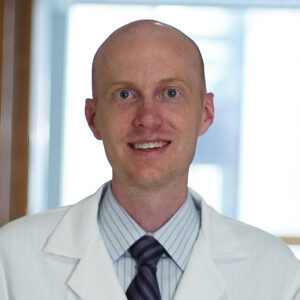
Dr. Jason Knight
The Henry Kunkel Early Career Investigator Award is given to physician-scientists who are within 12 years of post-rheumatology certifying examination eligibility and who have made outstanding and promising independent contributions to basic, translational or clinical research in the field of rheumatology. This year’s recipient is Jason S. Knight, MD, PhD, the Marvin and Betty Danto Research Professor of Connective Tissue Research and an associate professor of medicine in the Division of Rheumatology at the University of Michigan, Ann Arbor. His MD/PhD training was at the University of Michigan, with three years of that time spent at the University of Pennsylvania, Philadelphia, due to the relocation of his thesis advisor.
Dr. Knight’s rheumatology fellowship training was at the University of Michigan under the supervision of his program director, Rory Marks, MD, and his primary clinical mentor, Joe McCune, MD. His postdoctoral research studying neutrophils in lupus-associated cardiovascular disease was performed under the mentorship of Mariana Kaplan, MD, and David Pinsky, MD.
Dr. Knight’s first academic position was in 2014 as an assistant professor in the Division of Rheumatology at the University of Michigan, at the time under the direction of David Fox, MD, and now under John Varga, MD. Dr. Knight was promoted to the role of associate professor in 2019 and was appointed associate chief for research in the Division of Rheumatology in 2023.
Dr. Knight’s research program focuses on the role of neutrophils, platelets and endothelial cells in the vascular complications of autoimmune and inflammatory diseases, with a special interest in antiphospholipid syndrome (APS). Over the years, his work has been supported by the Rheumatology Research Foundation, Lupus Research Alliance, National Institute of Arthritis and Musculoskeletal and Skin Diseases, National Heart, Lung and Blood Institute, U.S. Department of Defense and Burroughs Wellcome Fund. He is a member of the American Society for Clinical Investigation and has published more than 120 peer-reviewed manuscripts, cited more than 12,000 times.
He has been corresponding author on manuscripts published in Science Translational Medicine, Nature Communications, The Journal of Clinical Investigation, and all the leading journals in the field of rheumatology. He is recognized internationally for expertise in APS pathogenesis, COVID-19 pathogenesis and the biology of neutrophil extracellular traps (NETs). His research has received numerous awards, including the Edmund L. Dubois Award from the ACR and the Mary Betty Stevens Young Investigator Prize from the Lupus Foundation of America.
“It is amazing to receive this honor, previously awarded to my first rheumatology research mentor, Mariana Kaplan, MD, and esteemed colleagues like Dinesh Khanna, MBBS, MSc, Amr Sawalha, MD, and Michelle Kahlenberg, MD, PhD,” Dr. Knight says. “All the credit goes to my mentors and mentees. I am especially grateful to the indefatigable Ray Zuo, MD, MSCS, who made some paradigm-shifting discoveries early in the pandemic with relevance for rheumatology patients and beyond.”
Innovation in Clinical Care Award
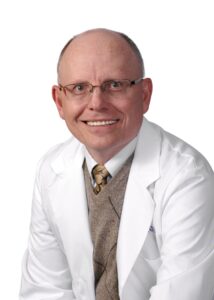
Dr. Thomas Olenginski Jr.
Thomas Paul Olenginski, MD, FACP, is the recipient of this year’s Innovation in Clinical Care Award. Introduced in 2021, the award is given to a community rheumatologist who has significantly advanced the practice of rheumatology through novel clinical initiatives.
Dr. Olenginski studied at Pennsylvania State College of Medicine, Hershey, and graduated in 1984. He completed his internal medicine residency at Geisinger Medical Center, Danville, Pa., in 1987 and served two years in the National Health Service Corps in Farrell and Sharon, Pa. He then entered rheumatology training at Geisinger Medical Center, completing his fellowship in 1991.
Dr. Olenginski worked for Susquehanna Health System, Williamsport, Pa., from 1991 to 1998. He served as president of the Lycoming County Medical Society in 1998. He then moved to work at Guthrie Clinic, Sayre, Pa., where he was a clinical densitometrist and his clinical interest in osteoporosis emerged.
Dr. Olenginski returned to Geisinger as an attending rheumatologist in 2001. Since then, he has been an active teacher to medical students, medicine residents and rheumatology fellows. He is a Distinguished Member of the Geisinger Academy of Educators. Additionally, he has helped mentor rheumatology nurse specialists and nurse practitioners who work in the High-Risk Osteoporosis Clinic (HiROC).
In 2001, Geisinger Rheumatology inaugurated its Mobile DXA (bone densitometry test) program, traveling to Geisinger primary care offices to provide DXA services closer to patients’ homes. Dr. Olenginski works closely with the mobile DXA team and interprets most DXA studies. He has served as chairman of the Bone Mineral Density (BMD) Committee, striving for consistency and quality.
In 2006, Dr. Olenginski developed an osteoporosis curriculum for Geisinger’s rheumatology fellowship program. Since the curriculum’s start-up, all fellows who have taken the International Society for Clinical Densitometry (ISCD) certification exam have passed and become clinical densitometrists.
In 2008, Dr. Olenginski was appointed physician-lead of Geisinger’s HiROC Program. Measuring HiROC performance has consistently shown that 70–75% of high-risk post-fracture patients who are followed in the HiROC are treated. Dr. Olenginski has published and presented this work; additionally, he continues to collaborate with the ACR, Bone Health and Osteoporosis Foundation, American Society for Bone and Mineral Research and ISCD.
Dr. Olenginski has been an ACR member since 1991. He served on ACR’s In-Training Exam Item Writing Task Force from 2007 to 2010. He served a two-year appointment on the ACR’s Annual Planning Committee and was the Meet the Professor expert on Fracture Risk Assessment Tool Methodology from 2010–12. He has spoken or presented at many conferences and has more than 50 peer-reviewed publications.
“I am grateful and honored to be recognized by the ACR for helping lead our Mobile DXA Program and HiROC FLS Program,” says Dr. Olenginski. “This award is a fitting tribute to our Geisinger Rheumatology team of coworkers and colleagues who helped champion these programs. Additionally, I am proud to witness the growth in our osteoporosis service line and ongoing dedication to our patients and referring physicians and practices.”
Paulding Phelps Award

Dr. Kelly Weselman
Kelly Weselman, MD, an attending physician with Wellstar Health System, Smyrna, Ga., is the recipient of this year’s Paulding Phelps Award, bestowed on a clinical rheumatologist for outstanding service to patients, community and the practice of medicine.
Dr. Weselman has provided high-quality care to people with rheumatic diseases in the metro Atlanta area for 22 years. She completed both medical school and internal medicine residency at Baylor College of Medicine, Houston, completed her rheumatology fellowship at Emory University School of Medicine, Atlanta, and started a community private practice in rheumatology. After nine years in private practice, she joined Wellstar Health System. She has continued to see patients and provide hospital consult services in the community setting.
During her years in practice, Dr. Weselman completed the Wellstar Physician Leadership Academy and Medical Association of Georgia Physician Leadership course. She volunteered on the Wellstar Medical Group Executive Committee for several years. She has led innovations in her healthcare system, including holding group visits for rheumatoid arthritis (RA) patients, designing Epic enhancements for rheumatology, piloting a scribe program and serving as a medical student preceptor. She introduced rheumatology ultrasound to her health system and is certified in musculoskeletal ultrasound.
Dr. Weselman is a Fellow of the ACR, a Fellow of the American College of Physicians and a member of the American Medical Association. Dr. Weselman has earned Top Doctor of Atlanta in Atlanta Magazine, Georgia Trend magazine and Modern Luxury magazine multiple times.
Dr. Weselman spent 10 years serving on the Executive Committee of the Georgia Society of Rheumatology, culminating in positions as president and immediate past president, and five subsequent years as treasurer. She has volunteered for the ACR in many roles including on the Board of Directors. Prior to that, she chaired the Communications and Marketing Committee, where she expanded Rheumatic Disease Awareness Month and the public awareness of the impact of rheumatic diseases.
Dr. Weselman also served on Strategic Planning task forces for the ACR, the Alternative Payment Models work group, the Healthcare Economics work group, and the ACR Governance and the ACR Access to Care task forces. At the onset of COVID-19 in 2020, Dr. Weselman served as chair of the COVID-19 Practice/Advocacy Task Force to help practicing physicians negotiate the challenges of providing care for patients during the pandemic. Currently, she serves on the Committee on Finance and as the scientific editor of the RA STEP program, designing an educational program for primary care doctors in rural areas to better diagnose and refer patients with rheumatoid arthritis.
Dr. Weselman has volunteered for the Arthritis Foundation and the Lupus Foundation of America. She advocates for rheumatology issues on Capitol Hill and has met with legislators in her community.
“I am so honored to receive the Paulding Phelps award this year,” Dr. Weselman says. “I appreciate the ACR celebrating the important contributions of community rheumatologists and I am honored to represent them. Thank you to the ACR and my colleagues for this award and thank you to the many patients I have had the pleasure to care for over the years.”
Patrice Fusillo is a writer and editor based in Oakland, Calif.



